By Jose Kavi
New Delhi, April 10, 2024: Catholics in India seem divided over the screening of a controversial film by a diocese in the southern Indian state of Kerala to enlighten teenagers against love jihad.
A group of Catholic intellectuals, mostly those living outside Kerala, condemned the Idukki Syro-Malabar diocese’s decision to screen the film “The Kerala Story.”
“That a Catholic diocese has screened the film, defies logic! First of all, the movie is clearly a propaganda film created to further the Hindutva narrative that is trying to destroy the secular nature of our country,” the 22-member group bemoaned in a press statement on April 10.
At the same time, youth organizations associated with some Syro-Malabar dioceses in Kerala have decided to screen the film that tells the story of a group of women from Kerala who were forced to convert to Islam and join ISIS.
In separate Facebook posts the youth pointed out that India’s Censor Board has not banned the film and congratulated the Idukki diocese for screening it.
“The movie will be exhibited in all units of the KCYM [Kerala Catholic Youth Movement] in Thamarassery diocese,” a Facebook post said.
Meanwhile, the Pro-Life Movement of Kerala defended the Idukki diocese’s action, saying political leaders don’t have to give permission to screen movies certified by the censor board.
“Malayali audience has the growth and maturity to decide which movie to watch,” asserts a Pro Life statement issued by its executive secretary Sabu Jose.
Jose questioned the silence of the same leaders when films, dramas and writings attacked Christian beliefs and personnel. “They deliberately kept their eyes shut on those occasions,” he alleged.
The letter of protest against the Idukki diocese’s decision pointed out that the film “is replete with lies, factual inaccuracies and half-truths; so much so, that the director of the movie, publicly admitted falsehood and had to correct the figures given in the original curtain-raiser from “32,000 girls embracing Islam to just three,” the statement explained.
Ten obnoxious scenes in the film, they added, had to be deleted before the Censor Board gave its certification.
“Far more importantly, this is a film which goes against the teachings of the Church and the person and message of Jesus,” asserts the 22-member group.
What pained the group was that the diocese screened the film on April 4, the day Pope Francis called for fostering respect for diversity, commitment to “our common home”, and the promotion of peace.
The diocese’s decision came a week after Kerala witnessed a heated debate over the film’s telecast by Doordarshan, the national broadcaster.
Kerala’s opposition Congress and ruling Communist Party of India protested the move with Chief Minister Pinarayi Vijayan warning that the telecast would “exacerbate communal tensions” ahead of the Lok Sabha polls.
He urged Doordarshan not to become a “propaganda machine” for the Bharatiya Janata Party that heads the federal coalition government.
The youth wing of the Tellicherry archdiocese sought to know why the politicians were scared.
“Dear politicians, why are you scared? To whom are you trying to appease?” said its FB post, apparently taking a dig at the political parties opposing the screening of the film.
The group protesting the diocese’s decision says the Church authorities’ decision “is deeply concerning because it actively sows seeds of hatred, intolerance and prejudice, among children, instead of promoting peace, compassion, and acceptance, which are the core values of Christianity.”
They warn that the screening of a film filled with lies would instil “negative emotions and discriminatory attitudes towards people of other faiths” and fail to teach children about love and respect for all religions and cultures.
“Such actions can have adverse effects on the future generation and society at large, particularly in the present politically charged context where hate is being weaponized to destroy the country,”
Observing that the censor board had certified the film only for adult viewing, the group wants to know how the diocese could ever think of showing it to children.
“Will the Diocese of Idukki now be prosecuted for screening the film to children?” the group asks.
The Vatican department for promoting interreligious dialogue “has emphasized the importance of strengthening and building good relations between Christians and Muslims during this Holy month of Ramadan,” the statement says.
“The diocese of Idukki, on the other hand, seems to have chosen to promote conflict and tension between the two communities,” it laments.
The group criticized those in authority in the Churches who “wish to kowtow towards those who have political power in order to keep their own ‘little empires’ safe.”

